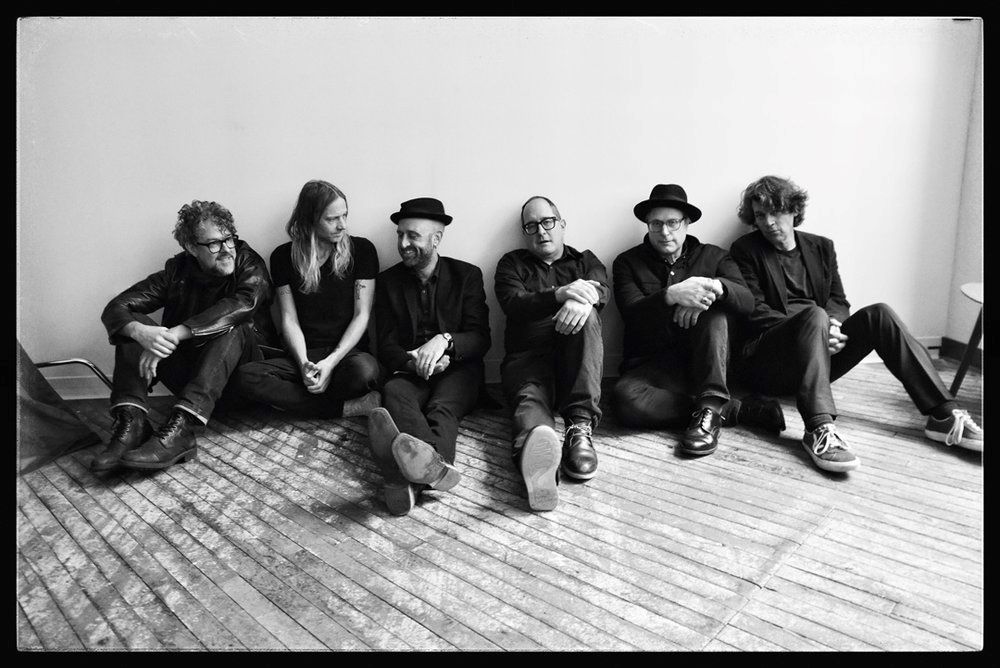
The Hold Steady recently celebrated the 20th anniversary of the band's formation. (Courtesy of Big Hassle Media)
One night in my college dorm room in 2006, procrastinating on homework again, I pulled up a link to The Hold Steady's new album on my laptop and listened as the first track played. Immediately, I unplugged my computer and ran with it into the hallway and down the stairs to a common room where my friends were hanging out. "Listen to this,” I insisted, and started the song again.
An arpeggiating piano chord and driving bass drum quickly joined the pulsating guitar riff. I was hooked, even before the first line of the chorus piqued my interest more. Add it all up and you have a perfect song.
I don't remember who was there when I played "Stuck Between Stations," or if anyone shared my instant enthusiasm. But I do remember what it felt like to be hit by that lightning bolt, to snap out of the anxiousness I felt for much of my college years. I remember the moment of falling in love with a band. That only happens a few times in a music fan's life – that sudden realization of love. And it means that whenever a new Hold Steady album comes out, as one did March 31, I am not an objective listener. I get as excited as you do when you're about to see an old friend for the first time in a while.
Craig Finn's songs – which typically take the form of short stories or prose poems, sung-spoken, set to rip-roaring rock 'n' roll – comprise an encyclopedia of people trying (and usually failing) to get by. The Hold Steady's new record, "The Price of Progress," continues this tradition while exploring new musical territory.
Stitch together lyrics from the album's first three tracks and you'll find the sorts of characters who have always populated Finn's music, both with The Hold Steady and in his solo career. Here is "an assortment of sad self-destroyers" ("Sideways Skull"). Some of them "changed medications and everything after went sideways" ("Carlos is Crying"). They look for relief at bars, on road trips, in pills and with ill-advised romantic partners; they "do what [they] do to survive" ("Grand Junction").
A Mass-going Catholic who was educated by Jesuits at Boston College, songwriter Craig Finn is part of the Catholic literary tradition that features wounded people doing bad things that end badly; but there’s a glimmer of hope for salvation.
Survival is at the heart of this record. Finn is an auteur of the peripheries, and in "The Price of Progress" he takes us on wild rides to places no other songwriter on the planet could dream up.
In "Understudies," our protagonists are an actor and a stagehand who, amped up after a performance and looking for something to help them sleep, visit a drug dealer working out of the backroom of a bakery. The theater director scrambles to find replacements when neither shows up the next night.
"Birdwatchers" and "Distortions of Faith" both tell stories of outsiders arriving in places ruled by repressive governmental regimes and getting caught up in dangerous situations, teetering on the edge of chaos. "Sideways Skull" centers a frontwoman in a rock band – but she's singing with a hairbrush mic at a halfway house. Maybe she has delusions of grandeur; or maybe the fantasy is just a way to find some joy in her otherwise painful life.
A Mass-going Catholic who was educated by Jesuits at Boston College, Finn is part of the Catholic literary tradition that includes Flannery O'Connor's haunting Southern Gothic stories and Graham Greene's "whiskey priest" from The Power and the Glory. All feature wounded people doing bad things that end badly; but there's a glimmer of hope for salvation. Finn's songs are reminiscent of the "sin; absolution; sin again; absolution again; sin again …" cycle baked into the Catholic sacrament of confession. Acting better is the aim; screwing up is assumed.

"The Price of Progress" is The Hold Steady's ninth studio LP. It was released March 31. (Courtesy of Big Hassle Media)
"Forgiveness and redemption are the [ideas] I keep coming back to,” Finn told me during a podcast interview in 2021. “I think that doing your best is the noblest thing we can do. And we will mess up and we will sin and we will stray. That said, the idea that we can't get too far gone is very powerful to me and it keeps showing up in my songs because those are the most interesting people to me, people who are a bit broken, that are desperate in some way, but can be saved. The idea that anyone can be saved has always been the interesting thing to me about Bible stories."
Often, what gives Finn's songs this Biblical sense of salvation within bleak situations is the music itself. Frequently praised with superlatives like "the greatest bar band in America." The Hold Steady play loud and fast with world-conquering guitar riffs and piano solos from the band’s chief musical architects Tad Kubler (guitar) and Nicolay (keyboard). Their epic, quasi-liturgical live shows are filled with singalongs to favorite hits like "Sequestered in Memphis" and "Massive Nights." Despite the circumstances in the songs and the frequent awfulness of the real world, it's hard to listen to The Hold Steady and not feel energized.
"The Price of Progress" marks continued growth in the complexity of the band's musical arrangements and instrumentation, thanks in large part to the work of producer Josh Kaufman. There aren't many singalong candidates here; it's a densely layered album with strings, woodwinds, brass, hand percussion and more that rewards close, repeated headphone listening.
"Understudies" is the album’s peak achievement in musicality. It opens with spooky flute and strings, setting the vibe of the bakery-fronted backroom drug dealing operation. As the scene shifts to the song's protagonists putting on a show at the theater, the music transforms into a disco-esque dance groove with horns, funky bass and backup singers. Finn has called this record the most cinematic in the band's catalog, which feels right: the music plays a central role in moving the stories forward, as opposed to providing a backdrop for Finn's writing.
Advertisement
The characters in this collection of cinematic songs are suffering, but they're generally not alone – even if loneliness is a constant specter that will inevitably return. Survival is attempted via human connection, often flailing. In "Sixers," for example, a woman initiates a hookup with her new upstairs neighbor who's renting the penthouse. There's an awkward interaction, departure, regret: "She wakes up late for work with the sniffles and the spiraling shame."
In "Carlos is Crying," the titular character has an emotional breakdown while hanging out with friends at a bar, distressed that his sister has moved away with a jerk of a guy and that his own relationship is in peril. His buddies aren't quite sure what to do, but they're with him as he sobs.
This bar setting is fitting for The Hold Steady, and not just because they're the best "bar band" you've ever heard. "The Price of Progress" is filled with stories you could imagine friends sharing over a pint, with some great tunes playing on the jukebox. This album – like the eight records that came before it, like the band's commitment to the rabid fanbase they have cultivated over two decades, like the communitarian values of Finn's Catholicism – professes a clear belief about the world: The only way to make it through life is together.








